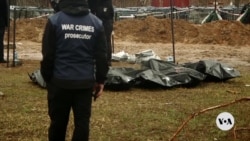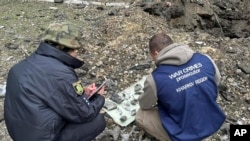Campaigners in Georgia are seeking to highlight atrocities committed by invading Russian troops and allied militias during the early 1990s, which they say should have been a warning of the dangers posed by Russia long before Moscow’s full-scale invasion of Ukraine in 2022.
Their campaign, “Before Bucha Was Abkhazia,” is touring U.S. and European cities and includes documentary screenings, photography exhibitions and presentations.
Russian atrocities
As the Soviet Union was collapsing, Georgia declared independence in 1991. There were tensions between Georgians and ethnic minority groups in the Abkhazia and South Ossetia regions bordering Russia. Many Georgians say Moscow exploited those tensions to stoke conflict.
Tamar Chergoleishvili, manager of the “Before Bucha Was Abkhazia” campaign, says Russia was to blame for the conflict.
“Wars broke out in Georgia that were branded as ethnic conflicts and civil war. But, in fact, it was Russia that was organizing all the turmoil, wars and bloodshed in order to dismember Georgia and not to allow a newly independent state to become truly independent, truly sovereign, and to become the member of the Western democratic world,” she told VOA.
Russia disputes that history and insists it sent troops into Abkhazia and South Ossetia as peacekeepers.
The ensuing conflicts between Georgians, Russians and their allied ethnic minority militias from 1989 to 1994 killed an estimated 10,000 to 30,000 people. More than 200,000 were forced to flee their homes. Many have never been able to return.
Survivors of the conflict say multiple atrocities were committed by armed separatists and their Russian allies. In one notorious incident, witnesses say 300 women and girls were held in a school and systematically raped. There are hundreds of other testimonies recounting killings and torture.
Taliko Zarandia recalled the killing of her neighbor’s son in Abkhazia.
“The militants arrived and charged at us like wolves,” she said. “They rushed towards the boy and asked how old he was. He replied that he was 15. ‘You deserve 15 bullets then,’ they replied. Then, they shot him 15 times in the head,” Zarandia said.
Ethnic cleansing
Russia denies its forces committed war crimes. However, the Organization for Security and Co-operation in Europe describes what happened in Abkhazia as ethnic cleansing.
The harrowing testimony of survivors is reminiscent of the accounts from Ukrainians following Russia’s February 2022 full-scale invasion.
In Ukrainian cities Bucha and Irpin, survivors describe similar killings, rapes and torture carried out by Moscow’s forces, which Russia also denies, despite widespread evidence and the uncovering of mass graves. The International Criminal Court in The Hague is investigating possible war crimes by Russian forces.
Chergoleishvili, who founded the independent news agency Tabula Media, said she was inspired to launch the campaign after Ukrainian television journalists contacted her for information on what had happened in Abkhazia.
“We all knew that something horrible had happened in Abkhazia, but it was so dusty. No one wanted to go through it ever again. But Ukrainians made me to go through the material before giving [it to] them, and I had goosebumps, and I felt so shameful,” she said, adding that Moscow’s war in Ukraine has alerted the world to the threat from Russia.
Warning to West
“Now we think that it is a good time — when there is the readiness to receive that information on the Western side — to remind the world, and ourselves, about the forgotten victims from Georgia that suffered the same aggression that Russia is using now against Ukraine. Just to warn the West that if they don't stop Russia in Ukraine now, they will have to spend 100 times more in another 30 years,” Chergoleishvili told VOA.
Russia invaded Georgia again in 2008. It still occupies 20% of Georgian territory, including Abkhazia and South Ossetia. Many Georgians say their experiences should have provided the West with ample warning of the dangers posed by Russia, long before its February 2022 invasion of Ukraine.







